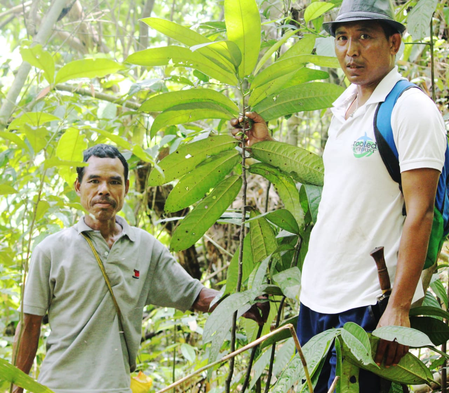
Kohima — In a groundbreaking study, researchers from Nagaland University, the state’s only Central university, in collaboration with an Assam-based private university, have conducted the first comprehensive scientific investigation into Goniothalamus simonsii — a rare, endangered, and endemic medicinal plant native to the forests of Meghalaya.
Traditionally used by indigenous communities to treat ailments such as gastrointestinal disorders, throat irritation, typhoid fever, and malaria, the plant had never been scientifically analyzed for its pharmacological properties — until now.
According to Nagaland University officials, the study scientifically validates the plant’s traditional uses and reveals that G. simonsii is a rich source of bioactive phytochemicals exhibiting strong antioxidant, antimicrobial, and anticancer properties.
By employing advanced analytical tools and computational modeling, the researchers demonstrated how the plant’s natural compounds interact with cancer-related proteins, paving the way for the development of novel, nature-based therapeutic drugs.
The research was led by Dr. Mayur Mausoom Phukan, Assistant Professor at the Department of Forestry, Nagaland University, alongside his student Samson Rosly Sangma. Their work, published in October 2025 in a reputed scientific journal, was co-authored by Dr. Pranay Punj Pankaj, Associate Professor in Zoology, Vahshi Chongloi, Research Scholar at Nagaland University, and Dr. Dhrubajyoti Gogoi, Assistant Professor at the Assam-based private university.
Speaking on the achievement, Prof. Jagadish K. Patnaik, Vice Chancellor of Nagaland University, said:
“Through this pioneering study, our researchers are contributing not only to the conservation and understanding of a rare species but also to bridging traditional knowledge with modern science. This collaboration exemplifies how regional universities can drive innovation rooted in local biodiversity.”
Prof. Patnaik commended the team for their dedication, adding that the research “will open new pathways for the sustainable utilization of India’s rich biological resources.”
Elaborating further, Dr. Phukan emphasized the study’s global relevance:
“This research bridges traditional knowledge with modern science at a time when antibiotic resistance, chronic diseases, and side effects from synthetic drugs are major global concerns. It highlights the untapped potential of India’s biodiversity in modern drug discovery.”
Research scholar Samson Rosly Sangma highlighted the urgency of conservation efforts, noting that Goniothalamus simonsii is now listed as ‘Endangered’ by the International Union for Conservation of Nature (IUCN) and found only in a few natural habitats due to declining populations and low public awareness.
“By generating robust scientific data, we hope to encourage conservation and cultivation efforts to ensure the plant’s sustainable use and long-term protection,” Sangma said.
Beyond its immediate medicinal implications, the study serves as a model for integrating traditional ethnomedicinal wisdom with biotechnology and computational research, aligning with India’s growing focus on leveraging indigenous biodiversity for affordable, accessible healthcare innovations.
Looking ahead, the research team plans to conduct in vivo and clinical studies to validate their findings and explore the plant’s potential in developing future phytopharmaceutical formulations.
With inputs from IANS